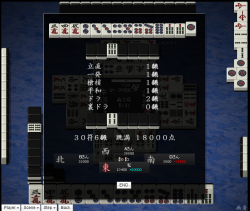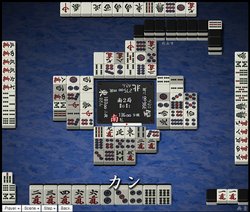Chankan: Difference between revisions
m (→Machi) |
m (fix format/spelling) |
||
| (8 intermediate revisions by the same user not shown) | |||
| Line 11: | Line 11: | ||
* [http://tenhou.net/0/?log=2015032605gm-0089-0000-70f97ed2&tw=0 Chankan baiman] | * [http://tenhou.net/0/?log=2015032605gm-0089-0000-70f97ed2&tw=0 Chankan baiman] | ||
}} | }} | ||
'''Chankan''' {{kana|搶槓}} is a | '''Chankan''' {{kana|搶槓}} is a [[yaku]] scored when "robbing a kan". When an opponent upgrades an [[minkou|open triplet]] into an [[Kan#Shominkan|added kan]], you may call [[ron]] if the kan would be your winning tile, scoring chankan in the process. | ||
==Development== | ==Development== | ||
[[image:Chankan.png|250px|thumb|[http://tenhou.net/0/?log=2012112813gm-0009-7447-af4e435f&tw=2&ts=8 Chankan example], where the player declared ron on 1-pin and all four are shown as a kan.]] | [[image:Chankan.png|250px|thumb|[http://tenhou.net/0/?log=2012112813gm-0009-7447-af4e435f&tw=2&ts=8 Chankan example], where the player declared ron on 1-pin and all four are shown as a kan.]] | ||
* | With one exception, in order for chankan to occur: | ||
* | * You must be in [[tenpai]], waiting on a tile an opponent has already called [[pon]] for. Any tenpai hand can win with chankan, even if the hand would be "yakuless" otherwise. | ||
* The opponent must draw the 4th copy of the ponned tile, then declare a shouminkan (added kan) with it. | |||
The exception is with [[kokushi musou]]. A hand in tenpai for kokushi musou is allowed to call ron on a closed kan. Not all rulesets allow kokushi to ron a closed kan. | |||
Chankan can only happen to added kans. Closed kans cannot be ronned, except for the kokushi case described above. It would be impossible to ron an open kan, since when a tile is discarded, it can be used for eiher ron or open kan. Ron takes precedence over kan, so the player wins before the kan is made. If the ron call is skipped, you cannot retroactively ron after the kan is made. | |||
Chankan interrupts the call for kan before it starts. This means that [[kandora]] are not revealed after chankan, and chankan denies the opponent's [[rinshan]] draw. | Chankan interrupts the call for kan before it starts. This means that [[kandora]] are not revealed after chankan, and chankan denies the opponent's [[rinshan]] draw. | ||
=== | ===Wait=== | ||
{{main|Machi}} | {{main|Machi}} | ||
Because the opponent must have had possession of all 4 copies of the winning tile, it is impossible for you to have another copy of that tile. This means that [[shanpon]] and [[tanki]] waits are not compatible with this yaku. | |||
Therefore, the only basic waits available are [[penchan]], [[kanchan]], and [[ryanmen]]; all three are waits to complete a [[sequence]]. | |||
In the case for [[kokushi musou]], the hand will be tenpai for kokushi with one of the 13 tile types already paired, and it is waiting for the last tile type for completion. Depending on the ruleset, kokushi may or may not be allowed to win from a closed kan. | |||
=== | ===5th kan draw=== | ||
When a player is in tenpai for [[suukantsu]], some [[rule variations]] allow | When a player is in tenpai for [[suukantsu]], some [[rule variations]] allow calling a fifth kan to invoke a 4th kan draw. If a fifth kan is allowed in this way, chankan might not apply - the game (usually) ends before a chankan can happen. | ||
== Compatibility == | == Compatibility == | ||
| Line 43: | Line 42: | ||
{{Yaku compatibility table|CHK}} | {{Yaku compatibility table|CHK}} | ||
Chankan requires at least one sequence (excluding kokushi), because waits to complete a pair (tanki) or triplet (shanpon) would be impossible. This excludes [[toitoi]], [[chiitoitsu]], and [[honroutou]]. [[Ryanpeikou]] is also not allowed, due to the tile requirement. A ryanpeikou tenpai would require at least one copy of the winning tile, which prevents the other players from calling kan. | |||
As for [[rinshan]], [[haitei]], [[houtei]], and [[mentsumo]], it is physically impossible to combine any of these four with chankan. Rinshan, mentsumo, and haitei require a win by self draw, while chankan is always won with ron. In the case of houtei, a player is not allowed to call kan if there are no tiles left in the live wall, so a chankan cannot be the last discard. | As for [[rinshan]], [[haitei]], [[houtei]], and [[mentsumo]], it is physically impossible to combine any of these four with chankan. Rinshan, mentsumo, and haitei require a win by self draw, while chankan is always won with ron. In the case of houtei, a player is not allowed to call kan if there are no tiles left in the live wall, so a chankan cannot be the last "discard". | ||
=== Ippatsu === | === Ippatsu === | ||
The [[ippatsu]] yaku is normally interrupted by a kan call | The [[ippatsu]] yaku is normally interrupted by a kan call, and chankan requires an opponent to call kan. However, ippatsu is still not interrupted because the whole kan process has not been completed. The entire kan process includes the kan call itself, plus the rinshan draw and the discard afterwards. The chankan win occurs in the middle of that process, so ippatsu and chankan can be scored together. | ||
=== Double Riichi === | === Double Riichi === | ||
Latest revision as of 02:35, 11 September 2024
| Type | Yaku |
|---|---|
| Kanji | 搶槓 |
| English | Robbing a kan |
| Value | 1 han |
| Speed | Dependent |
| Difficulty | Very hard |
Chankan 「搶槓」 is a yaku scored when "robbing a kan". When an opponent upgrades an open triplet into an added kan, you may call ron if the kan would be your winning tile, scoring chankan in the process.
Development

With one exception, in order for chankan to occur:
- You must be in tenpai, waiting on a tile an opponent has already called pon for. Any tenpai hand can win with chankan, even if the hand would be "yakuless" otherwise.
- The opponent must draw the 4th copy of the ponned tile, then declare a shouminkan (added kan) with it.
The exception is with kokushi musou. A hand in tenpai for kokushi musou is allowed to call ron on a closed kan. Not all rulesets allow kokushi to ron a closed kan.
Chankan can only happen to added kans. Closed kans cannot be ronned, except for the kokushi case described above. It would be impossible to ron an open kan, since when a tile is discarded, it can be used for eiher ron or open kan. Ron takes precedence over kan, so the player wins before the kan is made. If the ron call is skipped, you cannot retroactively ron after the kan is made.
Chankan interrupts the call for kan before it starts. This means that kandora are not revealed after chankan, and chankan denies the opponent's rinshan draw.
Wait
Because the opponent must have had possession of all 4 copies of the winning tile, it is impossible for you to have another copy of that tile. This means that shanpon and tanki waits are not compatible with this yaku.
Therefore, the only basic waits available are penchan, kanchan, and ryanmen; all three are waits to complete a sequence.
In the case for kokushi musou, the hand will be tenpai for kokushi with one of the 13 tile types already paired, and it is waiting for the last tile type for completion. Depending on the ruleset, kokushi may or may not be allowed to win from a closed kan.
5th kan draw
When a player is in tenpai for suukantsu, some rule variations allow calling a fifth kan to invoke a 4th kan draw. If a fifth kan is allowed in this way, chankan might not apply - the game (usually) ends before a chankan can happen.
Compatibility
^ Ippatsu requires riichi to be of any use.
| RCH | DRI | IPP | SMO | TAN | PFU | IPK | ITT | YAK | SDJ | SDO | TOI | SNA | SNK | CHA | JUN | RPK | SSG | HRO | HON | CHN | CHI | RIN | HAI | HOU | CHK | |
| CHK |
Chankan requires at least one sequence (excluding kokushi), because waits to complete a pair (tanki) or triplet (shanpon) would be impossible. This excludes toitoi, chiitoitsu, and honroutou. Ryanpeikou is also not allowed, due to the tile requirement. A ryanpeikou tenpai would require at least one copy of the winning tile, which prevents the other players from calling kan.
As for rinshan, haitei, houtei, and mentsumo, it is physically impossible to combine any of these four with chankan. Rinshan, mentsumo, and haitei require a win by self draw, while chankan is always won with ron. In the case of houtei, a player is not allowed to call kan if there are no tiles left in the live wall, so a chankan cannot be the last "discard".
Ippatsu
The ippatsu yaku is normally interrupted by a kan call, and chankan requires an opponent to call kan. However, ippatsu is still not interrupted because the whole kan process has not been completed. The entire kan process includes the kan call itself, plus the rinshan draw and the discard afterwards. The chankan win occurs in the middle of that process, so ippatsu and chankan can be scored together.
Double Riichi
Chankan requires an added kan, which itself requires a pon. This invalidates double riichi for any regular hand:
- If a pon is made before the riichi call, double riichi is negated.
- If the pon call happens after the riichi call, then the double riichi player must have declined their winning tile, invoking furiten. Since chankan can only be won off ron, furiten makes this yaku impossible.
However, an exception exists with kokushi musou. Depending on rule variation, kokushi may be won off a closed kan, which does not require a previous pon call. Therefore, in order to win with double riichi + chankan, it must also have kokushi. Since this would be a yakuman hand, neither double riichi or chankan would actually be scored.
Kokushi musou variation

If the rules allow, a special case for kokushi musou exists. When a kokushi hand is in tenpai, it may win if an opponent calls a closed kan for the tile you are winning for. Thus, ron may be declared, invoking this special rule. This is the only case where a tile may be taken from an closed kan.
However, this particular rule may be subject to variation, which may or may not allow this play to occur.
External links
- Chankan in Japanese Wikipedia
| |||||||||||||||||||||||||||||||
